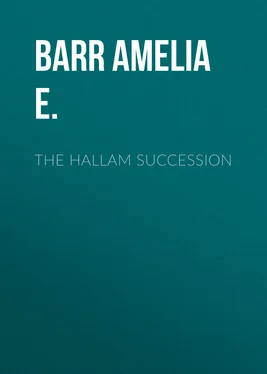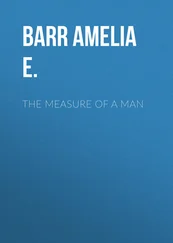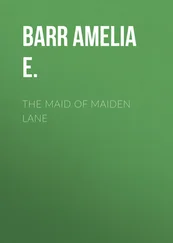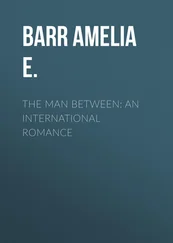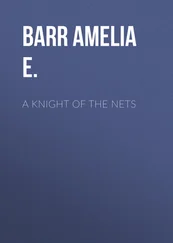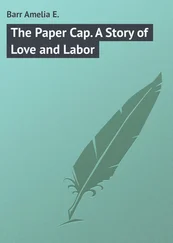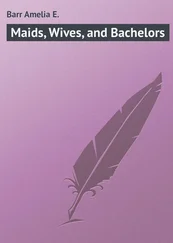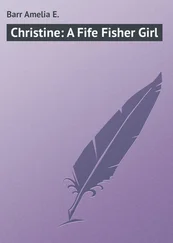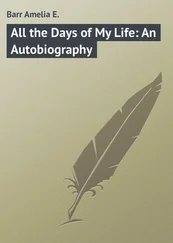Amelia Barr - The Hallam Succession
Здесь есть возможность читать онлайн «Amelia Barr - The Hallam Succession» — ознакомительный отрывок электронной книги совершенно бесплатно, а после прочтения отрывка купить полную версию. В некоторых случаях можно слушать аудио, скачать через торрент в формате fb2 и присутствует краткое содержание. Жанр: foreign_prose, foreign_antique, на английском языке. Описание произведения, (предисловие) а так же отзывы посетителей доступны на портале библиотеки ЛибКат.
- Название:The Hallam Succession
- Автор:
- Жанр:
- Год:неизвестен
- ISBN:нет данных
- Рейтинг книги:5 / 5. Голосов: 1
-
Избранное:Добавить в избранное
- Отзывы:
-
Ваша оценка:
- 100
- 1
- 2
- 3
- 4
- 5
The Hallam Succession: краткое содержание, описание и аннотация
Предлагаем к чтению аннотацию, описание, краткое содержание или предисловие (зависит от того, что написал сам автор книги «The Hallam Succession»). Если вы не нашли необходимую информацию о книге — напишите в комментариях, мы постараемся отыскать её.
The Hallam Succession — читать онлайн ознакомительный отрывок
Ниже представлен текст книги, разбитый по страницам. Система сохранения места последней прочитанной страницы, позволяет с удобством читать онлайн бесплатно книгу «The Hallam Succession», без необходимости каждый раз заново искать на чём Вы остановились. Поставьте закладку, и сможете в любой момент перейти на страницу, на которой закончили чтение.
Интервал:
Закладка:
"Father, George Eltham and I are thinking of going into business together."
"Whatever is ta saying? Business? What business?"
"Banking."
"Now, then, be quiet, will ta? Such nonsense!"
"I am in dead earnest, father. I cannot waste my life any longer."
"Who asks thee to waste thy life? Hev I iver grudged thee any thing to make it happy? Thou hes hed t' best o' educations. If ta wants to travel, there's letters o' credit waiting for thee. If ta wants work, I've told thee there's acres and acres o' wheat on the Hallam marshes, if they were only drained. I'll find ta money, if ta wants work."
"Father, I could not put gold in a marsh, and then sit down and wait for the wheat to grow; and all the wheat on Hallam, unless it bore golden ears, would not satisfy me. George and I are going into Sir Thomas Harrington's for a few months. Lord Eltham has spoken to him. Then George is to marry Selina Digby. She has fifty thousand pounds; and we are going to begin business."
"Wi' fifty thousand pounds o' Miss Digby's money! It's t' meanest scheme I iver heard tell on! I'm fair shamed o' thee!"
"I must put into the firm fifty thousand pounds also; and I want to speak to you about it."
"For sure! How does ta think to get it out o' me now?"
"I could get Jews to advance it on my inheritance, but I would do nothing so mean and foolish as that. I thought it would be better to break the entail. You give me fifty thousand pounds as my share of Hallam, and you can have the reversion and leave the estate to whom you wish."
The squire fairly staggered. Break the entail! Sell Hallam! The young man was either mad, or he was the most wicked of sons.
"Does ta know what thou is talking about! Hallam has been ours for a thousand years. O Antony! Antony!"
"We have had it so long, father, that we have grown to it like vegetables."
"Has ta no love for t' old place? Look at it. Is there a bonnier spot in t' wide world? Why-a! There's an old saying,
"'When a' t' world is up aloft, God's share will be fair Hallam-Croft.'
"Look at ta dear old home, and t' sweet old gardens, and t' great park full o' oaks that hev sheltered Saxons, Danes, Normans—ivery race that has gone to make up t' Englishman o' to-day."
"There are plenty of fairer spots than Hallam. I will build a house far larger and more splendid than this. There shall be a Lord Hallam, an Earl Hallam, perhaps. Gold will buy any thing that is in the market."
"Get thee out o' my sight! And I'll tell Lord Eltham varry plainly what I think o' his meddling in my affairs. In order to set up his youngest son I must give up t' bond on t' home that was my fathers when his fathers were driving swine, the born thralls of the Kerdics of Kerdic Forest. Thou art no Hallam. No son o' mine. Get out o' my sight wi' thee!"
Antony went without anger and without hurry. He had expected even a worse scene. He sat down by the hall fire to think, and he was by no means hopeless as to his demand. But the squire had received a shock from which he never recovered himself. It was as if some evil thing had taken all the sweetest and dearest props of love, and struck him across the heart with them. He had a real well-defined heart-ache, for the mental shock had had bodily sympathies which would have prostrated a man of less finely balanced physique .
All night long he sat in his chair, or walked up and down his room. The anger which comes from wronged love and slighted advantages and false friendship alternately possessed him. The rooms he occupied in the east wing had been for generations the private rooms of the masters of Hallam, and its walls were covered with their pictures—fair, large men, who had for the most part lived simple, kindly lives, doing their duty faithfully in the station to which it had pleased God to call them. He found some comfort in their pictured presence. He stood long before his father, and tried to understand what he would have done in his position. Toward daylight he fell into a chill, uneasy sleep, and dreamed wearily and sadly of the old home. It was only a dream, but dreams are the hieroglyphics of the other world if we had the key to them; and at any rate the influences they leave behind are real enough. "Poor Martha!" was the squire's first thought on rousing himself. "I know now what t' heart-ache she spoke of is like. I'm feared I heven't been as sorry as I might hev been for her."
Yet that very night, while the squire was suffering from the first shock of wounded, indignant amazement, God had taken Martha's case in his own hand. The turn in Ben's trouble began just when the preacher spoke to Martha. At that hour Bill Laycock entered the village ale-house and called for a pot of porter. Three men, whom he knew well, were sitting at a table, drinking and talking. To one of them Bill said, "It's a fine night," and after a sulky pause the man answered, "It ails nowt." Then he looked at his mates, put down his pot, and walked out. In a few minutes the others followed.
Laycock went back to his house and sat down to think. There was no use fighting popular ill-will any longer. Mary would not walk on the same side of the street with him. It was the evident intention of the whole village to drive him away. He remembered that Swale had told him there was "a feeling against him," and advised him to leave. But Swale had offered to buy his house and forge for half their value, and he imagined there was a selfish motive in the advice. "And it's Swale's doing, I know," he muttered; "he's been a-fighting for it iver since. Well, I'll tak t' L300 he offers, wi' t' L80 I hev in t' house, I can make shift to reach t' other side o' t' world, and one side is happen as good as t' other side. I'll go and see Swale this varry hour."
He was arrested by a peculiar sound in the cellar beneath his feet, a sound that made him turn pale to the very lips. In a few moments the door opened, and Tim Bingley stepped into the room.
"Thou scoundrel! What does ta want here?"
"Thou get me summat to eat and drink, and then I'll tell thee what I want."
His tone was not to be disputed. He was a desperate man, and Laycock obeyed him.
"Thou told me thou would go abroad."
"I meant to go abroad, but I didn't. I got drunk and lost my brass. Thou'll hev to give me some more. I'll go clean off this time."
"I've got none to give thee."
"Varry well, then I'll hev to be took up; and if I'm sent to York Castle, thou'lt hev lodgings varry close to me. Mak' up thy mind to that, Bill Laycock."
"I didn't kill Clough, and thou can't say I did."
Bingley did not answer. He sat munching his bread and casting evil glances every now and then at his wretched entertainer.
"What does ta want?"
"Thou hed better give me a fresh suit o' clothes; these are fair worn out—and L20. I'll be i' Hull early to-morrow, and I'll tak' t' varry first ship I can get."
"How do I know thou will?"
"Thou'lt hev to trust my word—it's about as good as thine, I reckon."
O but the way of the transgressor is hard! There was nothing else to be done. Hatefully, scornfully, he tossed him a suit of his own clothes, and gave him L20 of his savings. Then he opened the door and looked carefully all around. It was near midnight, and all was so still that a bird moving in the branches could have been heard. But Laycock was singularly uneasy. He put on his hat and walked one hundred yards or more each way.
"Don't be a fool," said Bingley, angrily; "when did ta iver know any body about at this time o' night, save and it might be at Hallam or Crossley feasts?"
"But where was ta a' day, Bingley? Is ta sure nobody saw thee? And when did ta come into my cellar?"
"I'll tell thee, if ta is bad off to know. I got into Hallam at three o'clock this morning, and I hid mysen in Clough's shut-up mill a' day. Thou knows nobody cares to go nigh it, since—"
Читать дальшеИнтервал:
Закладка:
Похожие книги на «The Hallam Succession»
Представляем Вашему вниманию похожие книги на «The Hallam Succession» списком для выбора. Мы отобрали схожую по названию и смыслу литературу в надежде предоставить читателям больше вариантов отыскать новые, интересные, ещё непрочитанные произведения.
Обсуждение, отзывы о книге «The Hallam Succession» и просто собственные мнения читателей. Оставьте ваши комментарии, напишите, что Вы думаете о произведении, его смысле или главных героях. Укажите что конкретно понравилось, а что нет, и почему Вы так считаете.
